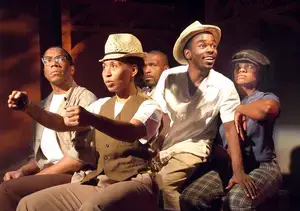Proving that a theater can be groundbreaking even when its grounds are closed, Arena Stage is launching a virtual spring season that includes a film about Indigenous North Americans and their relationship to the land — entirely written, directed and acted by Native people.
“Indigenous Earth Voices” will premiere in May, the fourth in a series of pandemic-era films that Arena Cultural Director Molly Smith has produced since the start of the outbreak that shuttered theaters around the world. Following the template of the other docudramas, which included “May 22, 2020” and “The 51st State,” “Indigenous Earth Voices” features the verbatim words of Native American and First Nation subjects from the United States and Canada as fashioned into monologues by Indigenous playwrights and actors.
“It’s a ‘heart’ project for me,” Smith said in a phone interview. “I just realized that more than half my life I’ve spent with Indigenous people, whether being in Alaska or being married to a Yankton Sioux.” Before coming to Arena in 1998, Smith spent 18 years at the Juneau company she founded, Perseverance Theatre, and her wife, Suzanne Blue Star Boy, is an artistic adviser on the film.AD
The movie is a key ingredient in a wholly reimagined 2021 for Arena. In a plan announced last July, its in-person performance season was to have started up again last month, with the world premiere of Eduardo Machado’s “Celia and Fidel.” Now that play, which was forced to close last March, and four other productions will be presented later, and subscribers have been offered refunds or exchanges.
The digital roster replacing them will also include a free streaming series called “Arena Riffs”: three original filmed musicals, each 20 to 30 minutes and debuting in March and April. Actor-director Psalmayene 24 will unveil his “The Freewheelin’ Insurgents,” a “pandemic-era hip-hop musical,” to be joined by as yet untitled projects by the indie-folk duo Shaun and Abigail Bengson and composer Rona Siddiqui.

“These are fully conceived and created for the virtual form,” Smith said, adding that the short versions may be developed into longer productions, possibly even for live stagings. “The artists in all three have said they have a hunger to continue to build on these projects, so we shall see.”
Psalmayene 24 was shooting “The Freewheelin’ Insurgents” in the District’s Rock Creek Park on Sunday, with four other actors: Louis Davis, Shannon Dorsey, Gary L. Perkins III and Justin Weaks.AD
“It’s the story of a cadre of hip-hop theater artists who are meeting to rehearse in Rock Creek Park,” said Psalmayene 24, who wrote three songs for the piece, with choreography by Tony Thomas and music direction by Nick “tha 1da” Hernandez.
“It explores issues like violent versus nonviolent protest, love and mental health,” he added. “And these artists are grappling with the inability to do what they love doing the most, which is live theater.”
Washington theaters have been increasingly active in creating content online, even if the monetary returns are meager. Arena has been particularly active in filmmaking. As Psalmayene 24 noted: “That’s one of the positive things that have come out of the pandemic. It’s forcing us to be creative. That’s what we need as artists: We need to be locked in a box to figure out how to break out.”
Arena will again offer digital classes with actors, playwrights and others, including such artists as Franchelle Stewart Dorn, Nehal Joshi and Machado. But perhaps the most noteworthy offering is “Indigenous Earth Voices,” by virtue of the unusual fact that a major American theater company is providing a breadth of opportunity to Native artists who struggle for national recognition.
Read the full article by Peter Marks for the Washington Post here.



